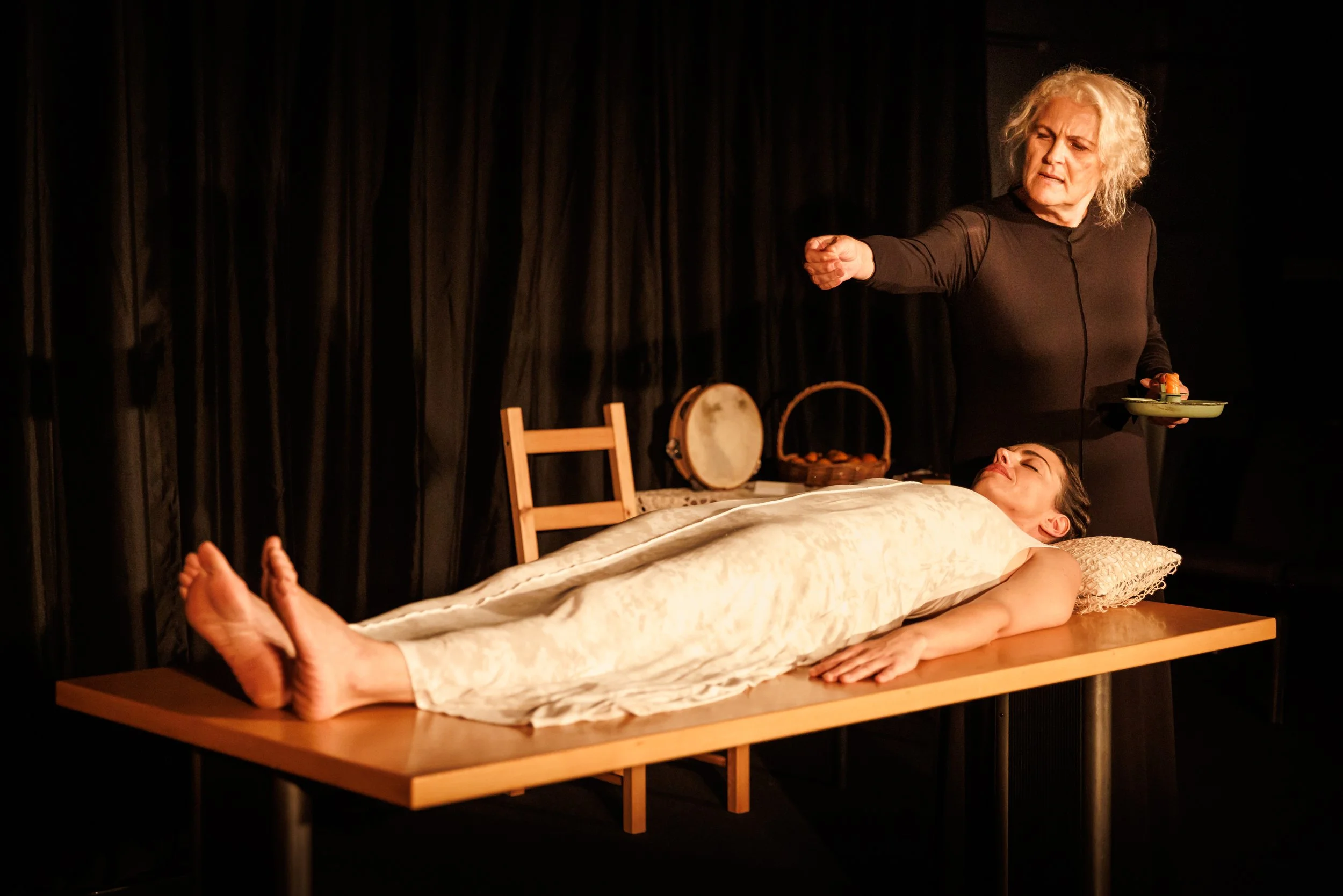REVIEW: The Last Sicilian, a poetic farewell to language and identity
The Last Sicilian is a play written by Rosanna Morales, and presented as part of La Mama’s Festival of Mother Tongues between 13 - 15 November. This production was staged at CO.AS.IT (Museo Italiano) and supported by Sicilian Arts Collective Australia.
Language: Sicilian and English
Performed by: Rosanna Morales, Rosa Voto and Irine Vela
Music by: Irina Vela and Rosa Voto
Dramaturgy by: Laurence Strangio and Rosanna Morales
Directed by: Laurence Strangio
Reviewed by: Patricia Mattia
Rosanna Morales and Rosa Voto star in The Last Sicilian. Presented as part of La Mama’s Festival of Mother Tongues November 2024. Image by Darren Gill.
Director Laurence Strangio and performers Rosa Voto, Rosanna Morales and Irine Vela pack a punch from the moment you walk through the door. You, the audience member, form part of the community of mourners carrying salt for a deceased woman. The woman represents the mother tongue of the island of Sicily, Italy.
The use of salt in the play has a historical significance originating from one of Sicily’s islands Mozia, where the oldest salt mine in the world remains in existence. Salt, for Sicily, was used in rituals, as a food preserver, a preventative to the bubonic plague and as a commodity exported to nearby countries.
More importantly, perhaps, Mozia is the location on the island of Sicily where the causeway to mainland Italy was destroyed by its own inhabitants to halt the assault from neighbouring tyrants. This action created Sicily as we know today. A beautiful standalone entity floating amongst its surrounding seas of the Mediterranean, Ionian, Tyrrhenian, and the Adriatic.
“Salt, for Sicily, was used in rituals, as a food preserver, a preventative to the bubonic plague and as a commodity exported to nearby countries”
Katie Williams does an impeccable job as technician and lighting operator to a set with captivating simplicity. The lighting amplifies and moulds the performance space from mortuary, to kitchen, to local streets and so on, so that the sparseness of the set is effectively utilised.
Alongside Katie is Irine Vela as musician. Irine adds to the atmosphere with the light and shade of her guitar. Highlighting silence in poignant moments, introducing the various scenes and bringing a comedic exasperation to the passion for life many Italians endure (notwithstanding what many non-Italians have come to know so well).
The bi-lingual use of English and Sicilian languages throughout the play was not a barrier to the mood and tone of the play. Instead, the languages playfully entwine creating atmosphere and warmly enveloping non-Sicilian speakers.
Added to this, the poetic use of the English language and the wailing cry in songs performed by Rosa Voto was palpable. Beautifully immortalising the loss many experience when moving away from their homeland and mother tongue. The connectivity and engagement of the audience was also measured by the hushed tones waiting on the next line delivered by Rosanna Morales who guides us on the emotions that can be finely expressed through the mother tongue.
Do not be fooled though by the serious theme of the play, as together Rosa and Rosanna managed to also evoke laughter associated with familiar experiences of the Italian diaspora.
Director Laurence Strangio is to be commended for the celebration of the Sicilian language throughout the play. Captivating the audience’s imagination, whilst acknowledging the historical influences of the region on Sicily’s language, song, and rituals. Laurence gave permission to each performer to shine solo yet simultaneously challenge each other. In a comparable way, highlighting the need to revive the Sicilian language but also containing it for its own preservation.
Overall, the play culminates in a vivid display of the intercultural soul of Sicily and the language fostered to celebrate this.
As an adjunct, oddly added at the end of the play, a reading of a poem reiterating the play itself. It is a little unclear what the purpose of the reading was. Perhaps it was a time filler considering the play was approximately 40 minutes in duration, perhaps it was a summation of the key theme of the play. If the latter, I believe the audience had already captured the essence of the performance, that being, the loss of the mother tongue that perambulates the loss of one’s identity.
Apart from this, one question remains in my mind. How to popularise the play amongst the public? I surmise the answer lies with the talent and directorship already engaged in delivering The Last Sicilian. I would be the first to queue to see the next reiteration!
This review is part of MAV’s initiative to foster culturally responsive theatre criticism, amplifying diverse voices and perspectives in the arts. By inviting writers, storytellers and artists to review the works of fellow creatives through the lens of shared lived, or cultural experiences, we aim to highlight the importance of theatre reviews that challenge dominant narratives and provide deeper, culturally grounded perspectives.



